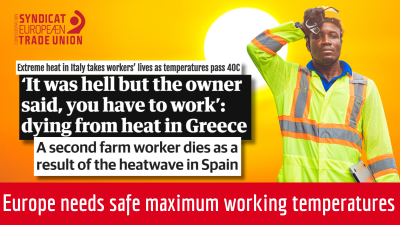Amid an investigation into the death of another cleaning worker during a heatwave, trade unions are calling again on the European Commission to deliver a directive on maximum working temperatures.
A 51-year-old woman collapsed at home on Saturday after completing her shift as a street cleaner in Barcelona. She is one of at least five people to lose their lives after working in high temperatures in Spain this summer and similar tragedies have occurred in Italy, France and Greece in recent summers.
The latest incident echoes the death of a street cleaner in Madrid during a heatwave in 2022, and shows again that heat-related deaths can occur even after exposure, reinforcing the need for stronger protections and more accurate data collection to avoid underreporting.
42% more deaths
The EU has seen a 42% increase in heat-related workplace fatalities since 2000, according to figures provided by the International Labour Organisation – the fastest increase in heat-related deaths at work of any part of the world.
When temperatures rise above 30°C, the risk of workplace accidents increases by 5-7% and, when temperatures exceed 38°C, accidents are between 10% to 15% more likely, research shows. Exposure to heat also has long-term health risks, raising the chances of cardiovascular, respiratory and other conditions such as chronic kidney disease or infertility.
But despite the increased risk, few countries have legislation to keep workers safe during heatwaves and too few are even collecting data about heat-related deaths or injuries at work.
That is why the European Trade Union Confederation (ETUC) is calling for the European Commission to bring forward a directive that delivers:
- Binding maximum working temperatures, taking into consideration sector-specific working conditions like nature and intensity of work, indoor and outdoor activities.
- A requirement for employers to work with trade unions to design and deliver safer workplace policies through collective bargaining agreements.
- Mandatory heat risk assessments for employers, integrating advanced indicators that consider e.g. temperature, humidity, and shade/exposure to sunlight, and airflow.
- Education and training for employers, workers, and supervisors on recognising symptoms of heat stress and implementing first-aid measures.
- The right to targeted and regular medical check-ups and health monitoring, which are needed to prevent underreporting of work-related heat stress, UV radiation, and other diseases.
ETUC General Secretary Esther Lynch said:
“Another summer brings another tragedy. How many workers need to die during heatwaves before we see some common sense rules put in place?
“This is an issue that affects countries across Europe, which is why the responsibility to bring forward a solution logically lies with the European Commission.
“It is clear for all to see in our daily lives that the climate is changing and we urgently need our laws to keep up if we’re going to avoid countless more avoidable deaths every summer.”
ETUC Confederal Secretary Giulio Romani said:
“Like any other risk to people’s health and safety, rising temperatures don’t need to be a death sentence for workers if we put in place sensible measures to keep people safe.
“Built on a strong Directive, employers should work with trade unions to ensure that there is a plan for how to work safety during heatwaves, whether that be through extra water breaks, protective clothing or access to shade.
“The European Commission has issued guidance to employers to tell them to provide these things but often the workers most at risk are migrant or seasonal workers who face precarious conditions. Keeping people safe needs to be the law, not merely advice.”
Notes
ETUC resolution on the content of a Directive on the prevention of occupational heat risks

